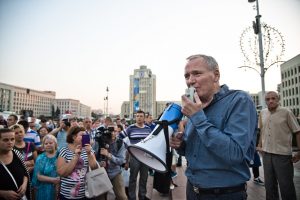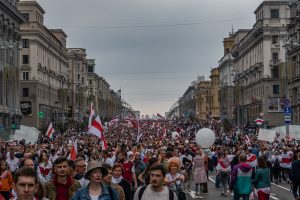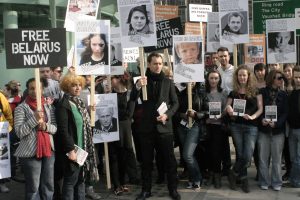By guest contributor Astha Bhattacharya*
INTRODUCTION
Belarus ratified its new anti-media law in May 2021, primarily aimed at limiting journalists’ freedom of expression and quelling protests against the Belarusian government. The new law makes it illegal for the media to report on any unauthorised public gatherings or to publish opinion polls unless the results have been approved by the government. This law also grants the government the authority to shut down media companies without judicial orders, which were previously necessary. Human rights organisations have slammed this law and the subsequent shutdowns of independent media outlets, claiming that the bill is intended to silence the growing criticism against the Belarusian government.

The new law was introduced in the aftermath of the 2020 uprisings against President Alexander Lukashenko, who has been in power since Belarus broke away from the Soviet Union in 1994. There has not been a single free and fair election in Belarus since 1995, according to the Organisation for Security and Co-operation in Europe. Additionally, Lukashenko has also been accused of rigging elections on innumerable instances. Regardless of the fact that Lukashenko was accused of mismanagement of COVID-19 and various other criticism, he is said to have reportedly secured about 80 percent of the vote in the 2020 elections. The police responded to this widespread criticism with a brutal crackdown when thousands of citizens marched in the streets to condemn this manipulation and to demand free and fair elections. In August 2020, around 7000 political opponents were imprisoned. provisions of the new mass media law and law on mass gatherings is thus being used to threaten independent media outlets in the country as recently as July 2021 to silence any kind of dissenting voices.
THE INFRINGEMENT OF CONSTITUTIONAL AND INTERNATIONAL OBLIGATIONS
The new anti-media law is a clear violation of Belarus’s Constitution, which provides citizens with the right to freedom of speech and expression (Article 34), as well as the ability to access, keep, and disseminate information about the government and state activities (Article 35). This latest act unconstitutionally aims to silence opposing viewpoints via infringing on fundamental rights through outlawing broadcasting on unauthorized mass gatherings and publication of opinion polls.
Article 19 of the Universal Declaration of Human Rights and Article 19 of the International Covenant on Civil and Political Rights (“ICCPR”) both promote freedom of the press. According to these articles, everyone has the right to freedom of speech and expression, which encompasses press freedom. The Human Rights Committee’s General Comment 10 considers this right as a duty upon authorities to not implement media censorship, since these actions might infringe upon people’s right to freedom of speech and expression. Belarus’s new law provides the government a free hand to shut down media outlets, which directly contradicts this notion.
THE CONSTRAINTS UPON PRESS FREEDOM IN BELARUS: THE SAGA OF PROHIBITING MASS GATHERINGS AND OPINION POLLS
The new law prohibits the broadcasting of unapproved mass gatherings and the publication of opinion polls and is primarily weaponized against critics of Lukashenko’s regime. This is in violation of the Human Rights Committee’s Resolution 33/2, which stipulates that national legislation, particularly those pertaining to public order, counter-terrorism, and national security, must respect press freedom and the states’ obligations towards journalists under international law.

It is important to highlight that while these resolutions have persuasive value, they are not legally binding upon governments. The current media law counters the Human Rights Committee’s judgment in the case of Koktish v. Belarus, in which the government of Belarus refused to certify a reporter who wanted to report from inside the House of Representatives. According to the Human Rights Committee, this is indeed a violation of Article 19 of the ICCPR (right to freedom of expression) in that there was no reason to curtail journalistic freedom for political purposes.
THE SHUTTING DOWN OF MEDIA COMPANIES
The new Belarusian media law also gives the Information Ministry the authority to shut down any media outlet without a court order. To quell dissent, the government can now intervene arbitrarily by shutting down news organizations that are protesting Lukashenko’s tyranny. This defers the Human Rights Committee’s appeal for governments to safeguard journalists and abstain from seizing or closing down media groups, as well as a number of international agreements that guarantee journalistic freedom. Locking down press operations, for instance, explicitly contradicts the UN General Assembly’s Third Committee resolution denouncing the arbitrary shutdown of media outlets and urging states to enact legislation to secure journalist freedom. Despite the fact that Frank La Rue, the former United Nations Special Rapporteur on freedom of speech and expression, stated in 2012 that nations should not use national legislation to prohibit the circulation of information that opposes the government, Belarus’ new law is being used for the exact same purpose. The Human Rights Committee’s General Comment 34 urges countries to protect journalists who disseminate material of public interest. However, Belarus’s new law blatantly disregards these international duties and tries to curtail the freedom of the media.
THE NEED FOR DODGING A TROUBLESOME PRECEDENT FOR FUTURE GENERATIONS
Belarus has a longstanding history of undermining press freedom. In 2018, the government had tightened its grip over internet media outlets through modifications to media regulations. Belarusian authorities recently redirected a plane bound for Lithuania based on a false bomb threat in order to arrest Raman Pratasevich, a journalist who had been put on a terrorist watch list due to his involvement in anti-government protests. Owing to the severe crackdown on journalists, Reporters Without Borders labelled Belarus the worst European country for press freedom, while the World Press Freedom Index ranked Belarus 158th out of 180 countries in its 2021 report. According to the Belarusian Association of Journalists, around 400 journalists have been detained by authorities between August 2020 and March 2021 with varied accounts of abuse and ill-treatment. This new media law is yet another stride towards strangling the country’s free speech and expression, which would have a ripple effect on the ongoing rallies against election rigging.
The international community should be concerned about Belarus’s violent persecution of journalists’ fundamental human rights. Despite being a signatory to the ICCPR, Belarus has frequently failed to meet its international commitments, setting a troubling precedent for the international community. As revealed by Amnesty International’s investigation on the usage of Pegasus software by several governments to spy on political opponents, governments all across the world have attempted to silence dissenting opinions time and again. If the world continues to ignore Belarus’s plight, it may set a precedent for other countries to quash opposition to the same extent.
The consequence of this new rule on Belarusian journalistic freedom has already been apparent. A government decree resulted in the shutdown of Tut.by., a leading independent web portal, on June 12. Furthermore, the government has also begun a string of investigations on the offices of various media companies. During the month of July, the Belarusian Association of Journalists reported that 64 raids were carried out in just a matter of ten days.
The international community should exert pressure on the Belarusian Government to reinstate civil rights, particularly media and speech freedom. The European Union has already taken a progressive step by slapping a plethora of trade sanctions on petroleum products, potassium chloride, and tobacco manufacturing items. Belarus’s access to financial markets has also been curtailed by the European Union. The Economic penalties may contribute to the restoration of civil freedoms as the economy is one of the country’s main cornerstones. These sanctions, which are aimed at limiting Belarus’s trade, would put pressure on the country’s current leadership to stop violating human rights.
* Astha Bhattacharya is an undergraduate student at National Law University, Odisha. Her research interest includes International Law and Human Rights Discourse.
Photos
“Free Belarus Now” by englishpen is licensed under CC BY-NC-SA 2.0
“Protest in October Square on 12 September against the rigged parliamentary elections” by Marco Fieber | ostblog.org is licensed under CC BY-NC-ND 2.0
“File:2020 Belarusian protests — Minsk, 23 August p0061.jpg” by Homoatrox is licensed under CC BY-SA 3.0

Hi, let me make some notes about this publication. In the first picture, we can see a protest against the rigged presidential election. Also, the Belarusian Constitution articles are incorrect: Article 33 should be instead of Article 34, and Article 34 should be instead of Article 35. Thanks